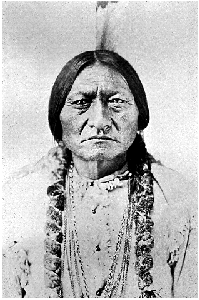 Another Stereotype of the Month entry:
Another Stereotype of the Month entry:
 Another Stereotype of the Month entry:
Another Stereotype of the Month entry:
Excerpts from an e-mail message about Sgt. Alan Two Crow, a member of the Cheyenne River Sioux Tribe. Two Crow disappeared while on duty at West Point; his body was found in a backwoods area 2 1/2 months later.
Finding Sgt. Two Crow
By Carter Camp
By all accounts Alan [Two Crow] turned into an excellent soldier for America, he graduated basic training and was trained as a Military Policeman. Over the years of his work in the military Alan was stationed in many places and served his country well, in 2001 Alan was stationed at West Point as part of the MP battalion which is assigned to guard the security of the Military Academy and the Corp of young officers being trained there. While assigned to this important duty by all accounts he served with distinction and was honored by his commanding officer as "Soldier of the Month" in June 2002. On July 14, 2002 between the hours of 12:30 and 1:00 A.M. Sgt. Alan Two Crow, child of Don and Mrs. Denise Two Crow, proud warrior of the Lakota Sioux people and soldier guardian of America...disappeared. Disappeared without a trace, missed his morning appointments and called no one. In the military way base authorities were notified and a fruitless search was begun. Out in South Dakota, on the Cheyenne River Indian Reservation a family began the long torture of helplessness, the ordeal of parents of a lost child, the search far away and impersonal.
.
.
.
On August 24 an article about the missing West Point soldier was printed in the Oklahoma Indian Times and reprinted in an online discussion group I belong to called ndn-aim. At first it seemed only of interest because the guy was from a rez around here but a friend of mine from New York, Maureen La Burt, was very surprised to learn of the disappearance from an Oklahoma paper while nothing was being printed about the missing Sgt. Two Crow in the NY area press. She wondered to me if the Army was truly doing anything to find him and I then encouraged her to ask around to find out what steps were being taken, she checked with some local police friends and found out they knew nothing about the missing soldier and the press knew nothing either. It seemed to us that very little was being done to find him locally but we thought perhaps they had information causing them to search elsewhere. With some trepidation about butting in on their private family business, I asked Maureen to contact the family to see if they could shed some light on the matter, what she found was profoundly disturbing. The little contact they had from the West Point investigators was hostile and accusatory, as if the family had conspired to cover up Alan's whereabouts. Hinting that he was awol and being hidden on the reservation. The investigator, Special Agent Lorrie Dinsmore, communicated by then only with Alan's ex-wife, stating that the rest of the family had been "hostile". Most of Lorrie's communications with Alan's ex-wife, Toni Gurule, were puzzling. She had asked if the investigators would be "able to get onto the reservation" to look for leads, clues or perhaps Alan himself. She indicated she thought it would be safer if the agents met the family in a nearby town, instead of going to their home on the reservation like they would do for all other Americans. As time went on it became clear that Agent Dinsmore and perhaps the entire Army at West Point had a completely wrong and stereotypical idea about American Indian people and our homelands, it was as if we were untrustworthy foreigners bent on harming Alan's comrades-in-arms!
.
.
.
On 9/6 in conversation with West Point media representatives, Wayne Hall a reporter for the "Times Herald Record" a local paper, was asked why he hadn't covered the story and if he would. Up to this point Wayne had known nothing of Sgt. Two Crow's disappearance. Unfortunately the Army still did not seem to be looking for anyone except an Indian stereotype. All the information shared with the reporters focused solely on the possibility that Two Crow had voluntarily gone AWOL and what the consequences might be for such a crime, including the possibility of even the death penalty. They mention the death penalty because it is "war time" and they were assuming, against all evidence and records, that the decorated Sgt had deserted.
Rob's comment
The stereotype here is that Indians aren't full-fledged Americans who are loyal to their country. In fact, their military service record shows they're far more loyal to the USA than most Americans are.
|
. . . |

|
All material © copyright its original owners, except where noted.
Original text and pictures © copyright 2007 by Robert Schmidt.
Copyrighted material is posted under the Fair Use provision of the Copyright Act,
which allows copying for nonprofit educational uses including criticism and commentary.
Comments sent to the publisher become the property of Blue Corn Comics
and may be used in other postings without permission.